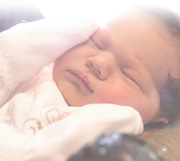- 1600 BIRTHS A YEAR

Mother-and-child unit
Giving birth is one of the most special moments in life. Therefore, Clínica IMQ Zorrotzaurre has facilities and multidisciplinary teams that consider childbirth comprehensively and work together to provide maximum safety for both the mother and the newborn child 24 hours a day.
-
It is essential that the pregnancy be appropriately monitored. The frequency and number of visits to the gynaecologist depends on each case and different tests will be run depending on the gestational period, such as blood and urine tests and scans with different indications for checking that your pregnancy and the foetus are developing correctly.
Some tests are run on all pregnant women whereas others are only for women who are susceptible to or are at greater risk of developing certain conditions, such as in the case of women over 35 years of age, adolescents, multiple pregnancies, women who experienced complications in previous pregnancies, and women who have chronic illnesses.
Possible tests include a 4D scan, which —amongst other functionalities— allows you to see your future son/daughter's face with better image quality, thanks to soft and delicate textures.
You will hear his/her heartbeat, see how he/she laughs, yawns, or moves around inside your belly, or sucks his/her thumb. A unique moment that you can share with your friends and family afterwards
Sometimes, even though we already know the gynaecologist who is going to look after us during the birth, we may feel more confident or secure if we know the facilities where we will give birth, the labour rooms, the delivery room, the maternity floor... Therefore, the clinic offers you the opportunity of seeing the facilities in advance, organizing a visit a month. If you are interested, you must send and email to matronas-imqajuriaguerra@imq.es indicating the following information:
- Name and surname
- Expected delivery date
- Nº ot people who will attend the visit
The clinic has 5 labour rooms, 2 delivery rooms and 1 theatre for caesarean sections for dealing with childbirths.
To guarantee the safety of the newborn, the clinic has a Neonatal Intermediate Care Unit for newborns that require special care
-
If you think you are in labour, go directly to the clinic's Casualty Department. Your details will be taken, an identification bracelet will be placed on your wrist, and you will be taken to the Gynaecology Unit. At the Gynaecology Unit, you will undergo a gynaecological assessment to determine whether labour has begun or not.
If it has, you will go to the labour room, which is fitted with a bath, TV, etc., and you will be monitored from a central monitoring station, where specialists will supervise the progress and frequency of your contractions.
After you have dilated, you will go to the delivery room and may be accompanied by your partner, as long as there is no medical reason against this.
When your child is born, before you go up to the maternity floor, you will go back to the labour room for 2 hours so both your condition and that of your newborn child can be appropriately supervised.
-
You will stay at the clinic for approximately 48 hours after the birth if it was normal, or for 3–5 days if it was a caesarean section. You will have a spacious, comfortable room for your stay, adapted to your requirements and those of the newborn child. Your stitches will be cleaned and dressed and you will receive the appropriate care on the maternity floor to help you recover quickly. In addition, both the Paediatrics and the Gynaecology teams will answer your queries and advise you on how to take care of your baby and yourself both at the clinic and at home .
-
The baby will have undergone his/her first physical examinations, both in the delivery room and during immediate postnatal care, to assess his/her vitality and whether there is any need to move him/her to the Neonatal Unit.
The baby will be weighed and given an intramuscular vitamin K injection, erythromycin ointment will be put on his/her eyes to prevent conjunctivitis and the umbilical cord will be disinfected.
After 48 hours, the blood spot test will be done, which involves taking a few drops of blood from the baby's heel by pricking it with a pin and is used for identifying congenital disorders.
Any queries or doubts you have in relation to feeding or caring for your new child will be answered by our team of paediatricians and nursing staff, who will be available 24 hours a day.
Tecnology
-
All of the labour rooms, the theatre and the delivery rooms and also the Neonatal Unit are centrally monitored continuously, recording all of the mother's and the newborn's vital signs in order to ensure their safety and clinical progress.
-
There are neonatal warming systems and incubators for any newborns who may require intermediate care after birth. There is also a transport incubator for any babies who have to be moved to other hospitals
Team
Frequently asked questions
-
I think I am in labour, when should I go to the clinic?
- If you think the sac has broken, in other words, if you notice an involuntary loss of liquid not related to urine. This means that the sac of amniotic liquid surrounding the foetus may have broken, which is popularly known as "waters breaking".
- 2 or 3 contractions of considerable intensity every 10 minutes or, even if they are not so frequent, if you have a history of fast deliveries.
- If you have begun to bleed as if you had a period.
- If you stop feeling the foetus moving.
- If you are feeling generally unwell or have a temperature for no apparent reason.
- If you are having a constant, painful contraction that is not stopping.
In any case, if you have any query or issue, remember that a team is permanently available for you.
-
Where should I go to give birth?
- To the clinic's Casualty Department: your details will be taken, an identification bracelet will be placed on your wrist, and you will be taken to the Casualty Department for the Gynaecology Unit.
- If it is a scheduled delivery (induction/caesarean), please go to the Admissions Desk so that your admission can be organised.
-
What documentation should I take to the clinic?
- The pregnancy record or the gynaecologist's assessment sheet with the results of the last tests.
- Documentation that you were given at the consultation: Informed consent forms for Analgesics, Admissions, etc.
- Insurance company card (IMQ, Sanitas, Mapfre, etc.)
- Identity card (DNI) or passport
-
What clothing should I take for me and for the baby?
For the mother, we recommend:
- 2 short-sleeved nightdresses that open completely down the front to facilitate breastfeeding.
- Dressing gown and slippers.
- 2 nursing bras with cups that open and pads for absorbing milk.
- High-waisted or disposable knickers — for the first day after the birth, above all.
- Essential for your hygiene: neutral soap, shampoo, a comb, a toothbrush and toothpaste, and all the creams you use.
- A change of underwear and clothes (loose and comfortable) for going home in
For the newborn:
- 6 cotton babygros
- 3 or 4 pyjamas
- 1 blanket
- Travel changing mat
- Nappies
- Articles for personal hygiene: sponge, etc.
- Bibs
- Clothes for going home in
-
How long am I going to stay at the clinic?
- If it is a normal delivery, you will be here for 48 hours.
- If you have had a caesarean section, you will be here for 3 to 5 days
